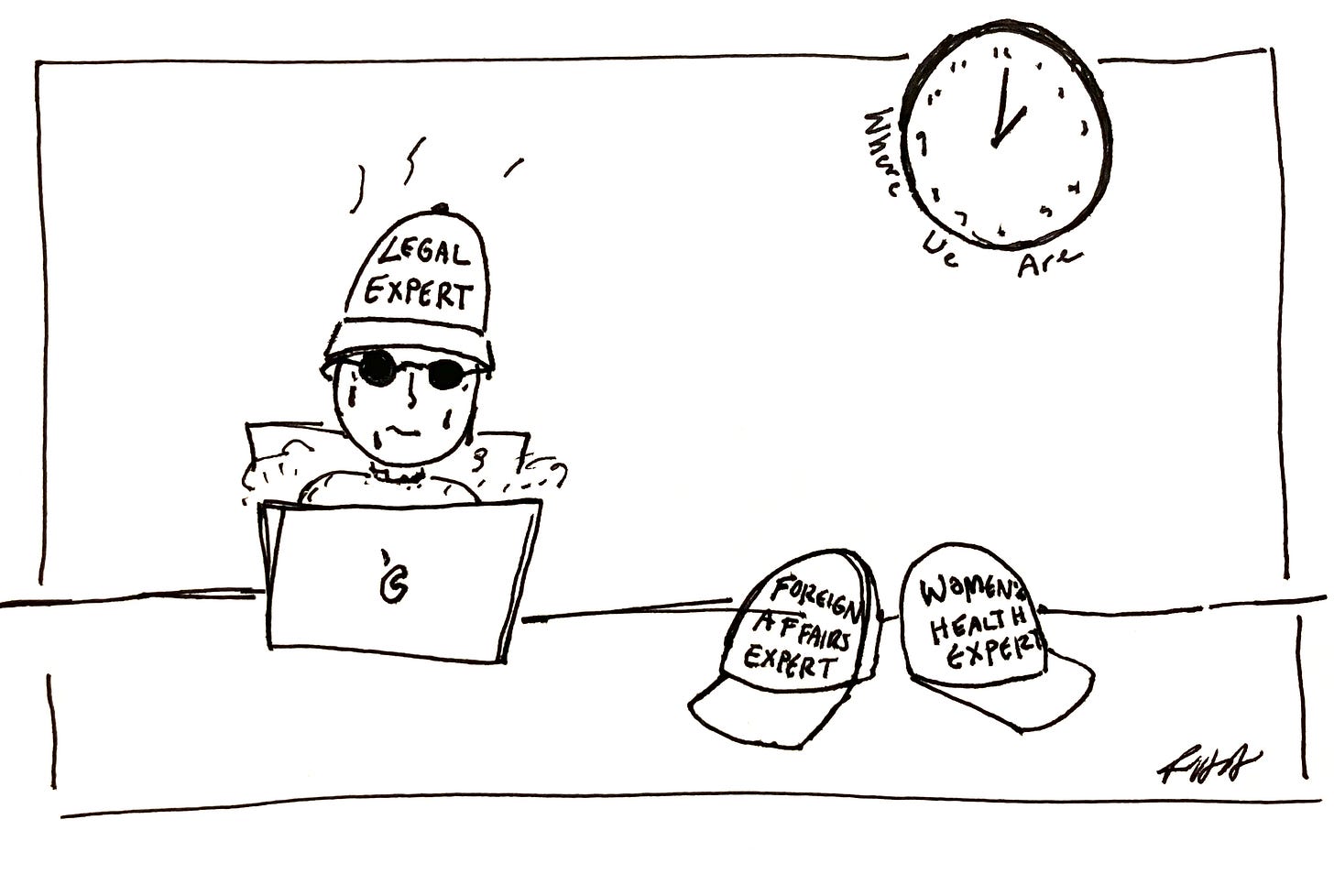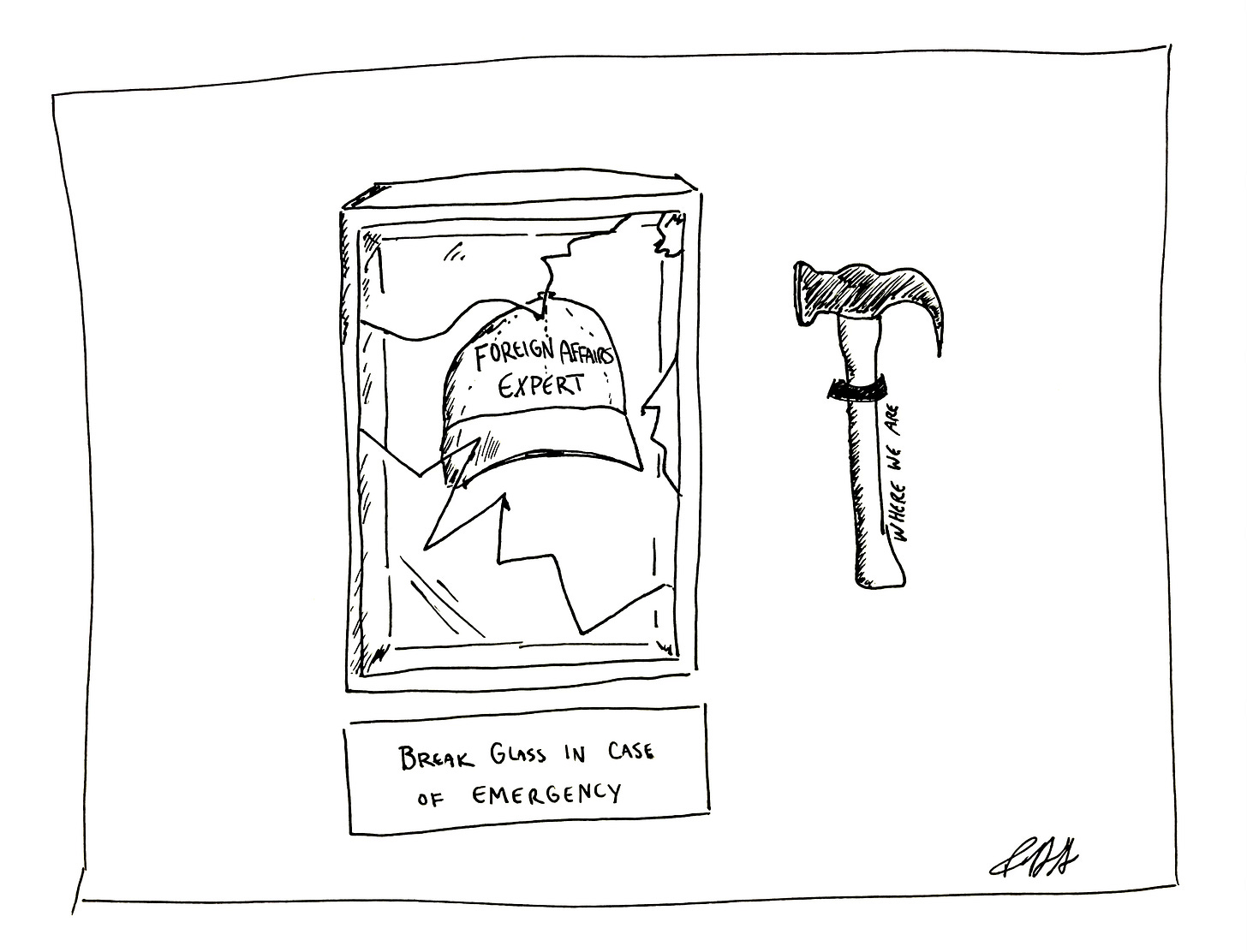Where We Are This Week
Free speech takes a hit in the Supreme Court, updates from Niger, Liam Gallagher & John Squire, and a fast (maybe) 50k.
After a windy, Sunday bike ride last weekend, my Garmin alerted me that I had just completed my fastest-ever 50k. It wasn’t a goal I had set out to accomplish which, unfortunately, probably says more about my fitness since I bought the cycling computer than it does my current form.
In an effort not to entirely diminish my effort from Sunday afternoon, it’s not as if I haven’t been training. Since my daughter was born, road rides have come on rare occasions, so I’ve found myself on the rollers on my patio or inside my shed killing myself in 45 minute installments.
It’s a regimen that was entirely created out of convenience and the necessity to conform to the ever-evolving nap/sleep schedule of my toddler. To its credit, however, it has been effective. I have no doubts that I’m a stronger cyclist this spring than I was two years ago - but exactly how fast am I?
I often text my dad the analysis of the ride I’ve just done (especially if it’s a particularly good one) because I know he’ll appreciate it having ridden the same roads as me for the last forty years of his life. On Sunday, sitting on my patio with a Topo Chico in hand and sunglasses perched on my head, I messaged him, coolly bragging about my latest achievement.
He obliged with congratulations and an appreciation at how fast his boy has become. To which I replied, “It’s easy to think you’re fast when you’re riding by yourself.” That’s the truth. I can’t tell you how many times I’ve laid down an effort on a climb thinking that there’s just no way someone could have done it that much faster than me only to find out later that the best time on that segment is a whole minute less than my best attempt.
Without comparison, it’s nearly impossible to understand how you’re doing. That’s why competition is important and relative isolation should be avoided as it easily leads to delusion and hubris - and ultimately, humiliation.
Fortunately for me, having worked for the better part of the decade at the premier bike shop in Tennessee and having ridden with the some of the fastest amateurs (and some pros) around, I don’t let myself get too far down that particular avenue. I don’t entertain too many self-inflating pats on the back, I simply change the context of the conversation. I’m not getting faster; I’m getting less slow.
A Manchester United (an album celebration)
Dreams do come true, my friends. They may not always come to fruition in the way that you’d expect, but, nevertheless, your wildest fantasies can become reality.
I’ve tossed coins into a well, I’ve held my breath during the 11:11 minute, and I’ve beseeched the Lord above. Alas, no Stone Roses or Oasis reunion album has coalesced but this month, something equally magical and unlikely has occurred.
Liam Gallagher, former Oasis frontman, and John Squire, the virtuosic guitar player and co-songwriter of The Stone Roses, released a full-length LP together. Simply titled Liam Gallagher John Squire, the record delivers on most of the broken promises their respective outfits have offered over the last couple of decades.
Though I did trade his parka for Fred Perry shirts, I spent the better part of my twenties trying to emulate Gallagher on stage while trying to decode the magic of The Stone Roses’ debut album in my living room. So, you can imagine my excitement when this project was announced earlier this year.
The record itself sounds basically what you’d expect two middle-aged white men to be making when left to their own devices save for the fact that it was written and performed by two of the most influential and iconic artists of the last thirty-five years. ‘You’re Not the Only One’ sounds like the Allman Brothers Band went Britpop, while tunes like ‘Love You Forever’ and ‘Just Another Rainbow’ could easily slot into the catalogs of Oasis or the Roses, respectively.
The result is that the 39 minutes of the album see the duo call forth the likes of Faces, the Rolling Stones, and The Clash - the opening seconds of ‘Mars to Liverpool’ are identical to ‘Lover’s Rock’ - really, I just double-checked. Of course, they manage to do this without ever dispensing with the near-oppressive Beatles’ influence that has colored (coloured) both of their careers.
It’s a supergroup that feels so logical, yet its members' idiosyncrasies and erratic nature made the possibility of its existence preposterous. But it’s here! Squire, who has had a successful career as a painter and visual artist since his band dissolved, appears to have not lost his songwriting prowess.
While no one could accuse the lyrics of being too complex, the forthrightness and honesty of the sentiment is endearing, if not moving. Why mince words if you don’t have to? After all, it was Kerouac who wrote, “One day I will find the right words, and they will be simple.”
Squire’s words dovetail perfectly with Gallagher’s ability to hold on to a note like an un-parabolic arrow cutting through the wind. His vocal range has clearly not been diminished by age like some of his notable contemporaries - ahem Damon Albarn - and he uses it to great effect. And no disrespect to his brother, Noel, it’s nice to hear him accompanied by a real-deal guitar player. The band is rocking and is a little glimpse of what Be Here Now could’ve sounded like if the ensemble had been tweaked slightly.
I ought to be using this moment to complain that, yet again, it’s a couple of dudes whose average between the two of them is 56 that is producing the most exciting, best-sounding record in recent memory. Of course, it’s entirely possible that this has much more to do with me than it does with the current state of music but if you read this newsletter often then you’ll recall that my opinions often masquerade as facts. Do with that what you will.
I’ve purchased other pieces of music over the last few weeks, but I’ve listened to this record the most by far. Last week, I pushed my chair next to our record cabinet, plugged my headphones into the Marantz, and flipped the vinyl from side A to side B several times for a few hours while writing this column. Sometimes, and it’s hard to put your finger on exactly what it is, a piece of art meets you where are - or where you need to be.
The songs on the record are ones of hope, gratitude, and resilience. It’s a timely reminder of how much of a gift those attitudes truly are. Having the courage and humility to express them is a miracle in itself - and so, maybe, is the album.
‘Here comes that feeling here it comes again I’m waiting for this storm to run out of rain.’
One for me, coup for you.
In August of last year, this column featured a story about the ongoing coup in Niger and the implications that it could have on politics in the region. Over half a year later, it might not be a bad idea to check back in with the African nation to see how things are going.
Thought it may not come as a shock any time the term military junta is involved, the situation regarding Niger and its Western allies isn’t exactly flourishing.
Never one to toot my own horn - blow, sure, toot, never - I’m slightly reluctant to point out the direction this could go. You’ll recall:
The people of Africa have continually been exploited by nation-states and multi-national corporations alike, and by some cruel ironic fate, the region is continually rich with natural resources even as global wants and needs have evolved.
On an international scale, however, what the coup does present is an opportunity for Russia. Over recent years, Russia has increasingly expanded its role in foreign affairs. From the Artsakh region in Armenia/Azerbaijan to the Syrian Civil War, and the support for the coup in Mali, Russia has excised influence in significant ways.
At the time of writing, Yevgeny Prigozhin, the former head of the Wagner Group who mysteriously died in an untimely airplane accident after orchestrating an attempted coup in his home country, had already offered his mercenaries’ services should they be needed. Poor Prigozhin didn’t live long enough to see the fruits of this offer, but a realignment of sorts is undoubtedly underway in Niger.
Diplomacy under the Biden administration continues to be a relatively unmitigated disaster during his first term. Sure, we’re not yet in a global war, but it does seem like - short of a nuclear exchange - Murphy’s Law has applied anytime an arm of the Biden White House has been extended.
Earlier this week, a delegation from the United States met with the governing body of Niger in the nation’s capital, Niamey, to discuss the future of diplomatic relations between the two countries. Yet again: it didn’t go well. The US representatives expressed their hopes that the junta would be returning to the country to a semblance of democracy in the future, and Col. Maj. Amadou Abdramane accused the Americans of wanting to manipulate the Nigerien government and having a ‘condescending attitude’ in a public announced later that day.
In what seems like a very-much-related incident, Abdramane then announced that Niger was terminating its military cooperation agreement with the US effective immediately, and that, now, “American presence on the territory of the Republic of Niger is illegal.” How badly can one meeting go?
The United States has some 600 troops stationed in a base in the West African country and its locale has become a central to the combatting of the ongoing Islamist insurgency in the Sahel region of the continent. Undoubtedly, ISIS won’t be too disappointed by the news that the US has to skip town prematurely.
Back to August 2023 me:
This falls in line with a developing story to which I’ve been playing close attention. The anti-French sentiment in Niger and the greater Françafrique conglomeration is equivalent to anti-Western sentiments. As the backlash of colonialism continues into the 21st century, countries like Russia and China, rightfully or wrongfully, offer a quasi antidote to the imperialism of the West.
What we’ve been seeing in the Middle East, Africa and South America (i.e. the BRICS nations) is a realignment of sorts that is threatening the United States and its Western allies as the global hegemon. And we all know what happens when global powers feel threatened!
Honestly, I couldn’t have said it better myself. Since late summer of last year, Niger has continued to strengthen its ties with Russia as it actively distanced itself from France and the United States. Russia has already strong ties with recently coup-ed Burkina Faso and Mali and new reports suggest that the arrival of military trainers and equipment from Russia is imminent - but the newfound alliances may not stop there. The destabilization of the region has led to a few movers and shakers looking to seize the opportunity.
What was most likely the reason for the US envoy’s visit to Niger this month were the reports that the African nation is entering into a deal with the Islamic Republican of Iran that would give access to Niger’s uranium reserves. The West African nation is the 7th largest producer of uranium as of 2022 so it’s no wonder why France was reluctant to give up its soft imperialism after all these years and why ‘We Want Nukes!’ Iran is seeking to foster a relationship with the country.
So, things are going great. It doesn’t take a shark to notice that the West’s blood is in the water, and its a foolhardy notion to think that if the West (namely the United States of America) reduces its influence on the world that no enterprising bad intentioned nation will assume its place.
A couple of things worth noting before we get too far over our skis here (which is a funny phrase to write for someone who has never gone skiing, snow or otherwise) that I would be remiss if I didn’t mention them.
It was Niger and its infamous ‘yellowcake’ uranium that George W. Bush famously erroneously claimed that Saddam Hussein had attempted to purchase in order to justify the invasion of Iraq. We wouldn’t dare make the same mistake twice would we?
Secondly, Iran has always vehemently denied their alleged pursuit if a nuclear weapon which, admittedly, is about as truthful the claim that I don’t ever toot my own horn. If Iran is only interested in nuclear energy, then I’m only writing this newsletter for the joys of expression.
Where my textualists at?
I’ve been so anti-government so long that I’ve been considering switching up my position on things. All work and no play makes Jack a dull boy after all. I thought I’d find something to shout from the rooftops about to celebrate the many achievements and the exemplary principles displayed by the federal government.
Not this week, I’m afraid.
Two state solicitors general from Missouri and Louisiana presented their preliminary arguments in front of the Supreme Court this week in a case that seeks to limit the contact and influence that the federal government can have over social media companies.
The suit originated as a result of the Biden Administration and other federal apparatuses badgering social media companies to regulate content it found to be ‘misinformation’ or ‘harmful’ regardless of the veracity or obvious subjectivity of those claims.
If you ever needed an example of why people use the term ‘uni-party’ in reference to Washington, DC, this is it. Initial reactions from the overwhelming majority of the justices are very much in favor of the federal government retaining the power to directly influence the content users are allowed to see on social media.
I used to defend the justices on the Supreme Court, saying that they weren’t necessarily partisan hacks toeing a party line whenever they were confronted with a debate. How optimistic I was. They’re not partisan in the sense that the House is split between the left and the right, however, they’re partial to power and the authoritative use of said power.
According to the New York Times:
Justices Brett M. Kavanaugh and Elena Kagan, both former White House lawyers, said interactions between administration officials and news outlets provided a valuable analogy. Efforts by officials to influence coverage are, they said, part of a valuable dialogue that is not prohibited by the First Amendment.
Pravda was famously a free-speech platform, didn’t you know? State influence on what consumers hear - or more to the point, what they don’t hear - isn’t necessary violative of the First Amendment rights of Americans according to justices from both the progressive and textualists wings of the bench.
Louisiana’s solicitor general, J. Benjamin Aguiñaga, illustrated the volume (both in amount and emphasis in his argument.
“Behind closed doors, the government badgers the platforms 24/7,” he said. “It abuses them with profanity. It warns that the highest levels of the White House are concerned. It ominously says that the White House is considering its options.”
“Under this onslaught,” he added, “the platforms routinely cave.”
It’s worth remembering that the federal government never makes requests or suggestions; it coerces. If the FBI were to call to inform you that whatever it was you were planning on doing is something they’d rather you not, what’s the most likely course of action you’re going to take?
Justice Kavanaugh, who served in the Bush Administration, gave away the game, saying that it’s “probably not uncommon for government officials to protest an upcoming story on surveillance or detention policy and say, you know, if you run that it’s going to harm the war effort and put Americans at risk.” It sounds more like an admission rather than speculation.
The Court likely won’t rule until the middle of summer, but if the initial comments from the justices are an indication of which way they’re leaning, it doesn’t bode well for free speech advocacy and the future of social media. As if it wasn’t bad enough already.
To a better next week,
Cheers,
~FDA






